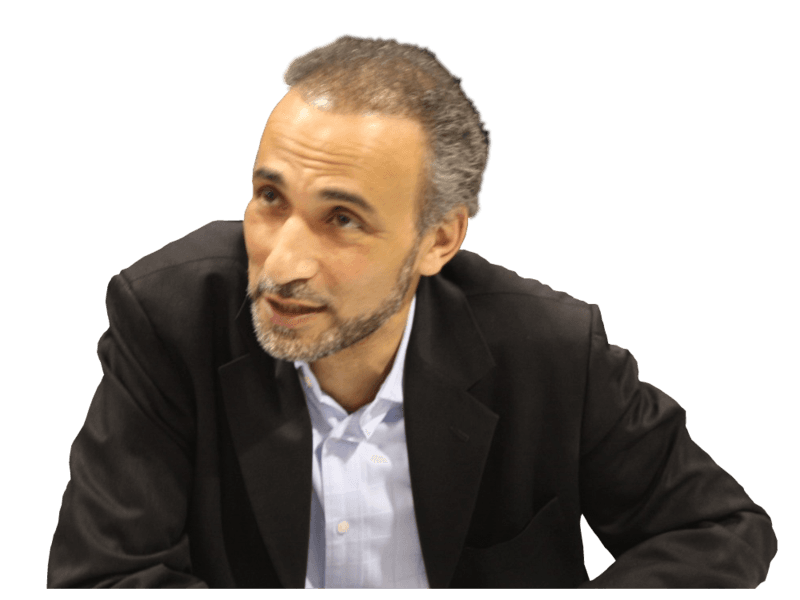Swiss philosopher tries to find common ground with contemporary Muslims, secular society
Ramadan’s controversial views have gotten him banned from Egypt, Saudi Arabia and the United States. (Photo by Sherurcij via Wikimedia Commons.)
Swiss philosopher Tariq Ramadan has been called the Muslim Martin Luther King.
He’s often described as Europe’s most important Muslim intellectual and travels widely trying to build bridges between European Muslims and conservative clerics.
Some countries, including the United States, have banned him. A few years ago, Ramadan was set to move with his family to Indiana, where he’d accepted a teaching job at Notre Dame, but the U.S State Department revoked his visa, alleging that he violated the Patriot Act. Ramadan says it’s because he’s an outspoken critic of U.S. policy, but his critics say he has ties to Muslim terrorists, though no evidence of a direct link has ever surfaced.
One reason Ramadan is so closely scrutinized is his family background. His grandfather, Hassan al-Banna, founded Egypt’s Muslim Brotherhood, the group that later spawned top leaders in al-Qaeda, but has also recently produced Egypt’s new president and Parliamentary majority. Ramadan himself is a devout Muslim, but one who wants to loosen the strict interpretations of Islamic law.
His book “In the Footsteps of the Prophet,” looks at Muhammad’s life as offering many lessons to contemporary Muslims. Ramadan said despite contemporary views about Muhammad, the prophet was very progressive.
“The prophet’s life is really an introduction to Islam. So, when you listen to people, the perception they have — it’s all about violence, it’s all about otherness, it’s all about discrimination toward women, and I think all this is wrong,” Ramadan said.
According to Ramadan, Muhammad was especially forward thinking about the status of women. He respected and valued women, though they weren’t valued in society, and welcomed women into mosques.
“And even domestic violence — they can’t just quote one part of a verse in the Quran, forgetting that the prophet himself never beat women. He was so respectful. So, if he is our example, we cannot accept domestic violence. This is not Islamic,” Ramadan said.
Ramadan seeks to find the common ground between secular Europeans and conservative Muslims who live in the Middle East. He has lived in several European countries and in Egypt, his country of origin.
“I am Swiss by nationality. I am European by culture. I’m Egyptian by memory. I am Universalist by principle, and Muslim of course, by religion,” he said.
Ramadan said the problem is not a clash of cultures, but rather, a clash of perceptions that can be deconstructed to get to common ground.
Islam is a minority religion in countries like France and England. In most Middle Eastern countries, there’s no effort to separate religion and politics, but in Europe, especially in France — there’s absolutely strict separation.
Many have said this has caused major problems for Muslims living in Europe. But Ramadan said this poses no problem for the five million Muslims already living in France. Instead, he said many French Muslims are dealing with discrimination and social marginalization.
“When we had the riots in the suburbs in November 2005, you had politicians speaking about them as if they were not French citizens,” Ramadan said. “I really think all this perception that Muslims cannot live in secular society is totally wrong. Millions are already doing it, living it, experiencing it.”
Ramadan has served as a voice of reform within the Islamic world. In 2010, he called for a moratorium on corporal punishment and stoning of women.
His call for moratorium angered a lot of conservatives and led Saudi Arabia and Egypt to ban him from entering their countries.
“My point here is not to please the West or to please the Islamic majority countries,” Ramadan said. “My point is really to be consistent with my values and principles of justice.”
Ramadan believes his values and principles on U.S. policy in Iraq and Israel led the U.S. to revoke his visa.
“I was saying, Look. Resistance is legitimate. The means they are using are not. But resistance is legitimate, and your invasion of Iraq was a mistake, it was illegal. So, I think that these are the main reasons,” Ramadan said.
Ramadan later found out he was banned from the United States because he gave €700 to a Swiss organization that was connected to Hamas. Ramadan, though, points out the group is officially recognized by the Swiss government.
“I myself told the American Embassy that I gave the money between 1998 and 2002 to help the organization to build schools. This organization was blacklisted in the States in 2003. I got a letter from the American Embassy telling me ‘You should reasonably have known that this organization was connected to Hamas.’ It’s ridiculous. How could I have known this?,” Ramadan said. “So it’s clear to me that this is a pretext and the true reason is that I’m vocal. I’m speaking loudly against the American policy in the region.”
After a lengthy legal battle, in January 2010, U.S. Secretary of State Hillary Clinton rescinded the ban on Ramadan visiting the United States. In April of that year, he spoke at a panel discussion in New York.
